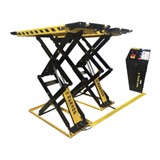Ford and Bug Labs, a company that offers the tools and support needed to prototype, pilot and produce innovative networked devices, have announced a joint development agreement to collaborate on a new in-car research platform named OpenXC.
Based on Bug Labs’ Bug System, OpenXC transforms the car into a plug-and-play platform where interchangeable open-source hardware and software modules can be quickly and easily customised to perform tasks deemed previously unimaginable by developers.
With OpenXC, consumers can create a personalised driving experience through the addition of countless add-ons. Innovations such as new visual and audio feedback interfaces, environmental sensors and safety devices can be implemented quickly by snapping Bug Labs’ hardware modules directly into Ford vehicles.
"OpenXC is about creating a platform that is totally accessible to the developer community and quickly incorporates local market needs to offer innovative solutions at an affordable price point," K. Venkatesh Prasad, senior technical leader, Infotronics, Ford Research and Innovation said.
"The platform is designed to help us answer the question of how Ford can accelerate the car connectivity experience around the globe, at a value proposition, for both mature and emerging markets."
Peter Semmelhack, founder and CEO of Bug Labs, agrees that an open-source platform approach such as OpenXC offers up limitless possibilities for customising the in-car experience to meet the different market needs around the globe.
"Combining open, modular hardware and software innovation with the next generation of vehicles reinforces Ford’s position as the world’s automotive technology leader," Semmelhack said.
"We are thrilled by the opportunity to collaborate with Ford on such a pioneering project."
Ford is the first automotive OEM to collaborate with Bug Labs, a company that Semmelhack founded in 2006 as a way for individuals and companies to break traditional barriers associated with new hardware development.
Ford researchers hope that lessons learned through the OpenXC research project will help prepare the company for such unique market conditions around the globe as diverse local languages and dialects, fast-changing content preferences, and the need for affordable “buy as you can” or even rental app solutions.
For Bug Labs, involvement in OpenXC signifies a paradigm shift in the way that automotive companies are exploring new ways to meet consumer demands.
The opportunity for automotive connectivity is tremendous. According to IHS Automotive, potential future global vehicle sales could reach nearly 110 million units per year by 2020, a nearly 30-million jump from where global sales stand today.
The biggest climber over the next nine years: Asia, with nearly 20 million more units expected to be sold in 2020 compared with 2011.
The vision for OpenXC is simple: the car becomes a docking station for Bug Labs interchangeable plug-and-play hardware and software modules programmed with only the connectivity features and services the driver wants.
Functions change with the addition or deletion of modules, giving owners the freedom to continually customise their experience without breaking the bank, and at the same time, adding value to their vehicles as new technologies are introduced, purchased and “plugged” in.
The idea was spawned during a trip Prasad took to India where he noticed that while most people couldn’t yet afford a car, they did have affordable feature phones with significant functionality.
"Virtually everyone carried phones rich in locally relevant features – all for a cost of about $40," Prasad said.
"So, the challenge became how can we deliver similarly relevant and affordable connectivity inside the car.
"Imagine you live in India, own a Ford Figo and love the game of cricket.
"Now imagine that you could purchase a $30 community cricket module from your local Ford dealer that was designed by a local developer and approved by Ford. This module plugs into a master control board in your car and your Figo would then play a community radio channel dedicated to cricket for the season. After the season is over, you could remove the module and replace it with something else."
OpenXC platform is designed to give Ford researchers and independent developers the ultimate sandbox to play in with minimal investment, where any and all ideas, concepts and theories for in-car connectivity can be shared, tested and verified.
"Open innovation platforms give communities globally the power to customise and personalise their products. As an added benefit, it also frees manufacturers, like Ford, from investing in, building and deploying low-volume highly customised vehicles for specific markets – while opening up opportunities for other manufacturers to create value-added products and services for Ford vehicles," Semmelhack said.








